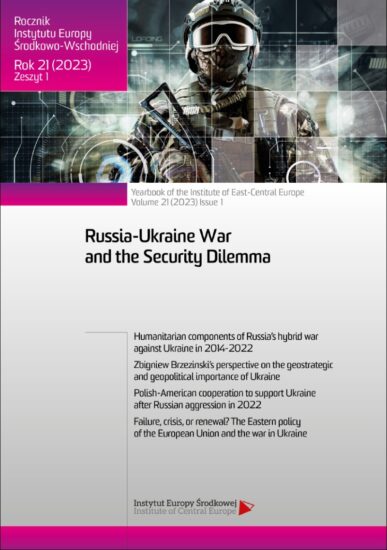Konflikty zbrojne a bezpieczeństwo państwa przez pryzmat wojny na Ukrainie
ORCID: Marian Kopczewski: 0000-0002-0402-0477
Afiliacja: General Tadeusz Kościuszko Military University of Land Forces, Faculty of Security Studies
Pages: 75-89
Edition: Lublin 2023
DOI: https://doi.org/10.36874/RIESW.2023.1.5
Citation method: M. Kopczewski, Armed conflicts and state security through the prism of the war in Ukraine, „Rocznik Instytutu Europy Środkowo-Wschodniej” 21 (2023), z. 1, s. 75-89, DOI: https://doi.org/10.36874/RIESW.2023.1.5
Abstract:
In recent years, we have seen a wide range of forms of armed conflict, varying in scale, intensity, complexity, and duration, blurring the lines between war and peace. These and other conditions were the reason for undertaking research aimed at identifying scenarios for the development of the international security situation and scenarios for the use of the Polish Armed Forces in relation to threats of a military nature in our country’s neighbourhood, in the region, and across the world. With this in mind, while conducting research on the above-mentioned issues, the article focused attention on a research problem which took the form of a question: How does the development of military threats and potential armed conflicts, including the one in Ukraine, affect the shaping of state security? The hypothesis took the form of an assumption that military threats and, consequently, armed conflicts are one of the main determinants of shaping state security. In the face of the threat of an armed conflict, states take actions to ensure their security, in particular, political, organisational, and modernisation activities, and above all, to increase their defence potential in view of war. The research was conducted in military universities, and the general population (N) included research and teaching staff. The research tool was a questionnaire posted on the MS Teams online platform, which is also used to educate students at military universities.
Bibliography:
1. Borecka-Biernat D., Wajszczyk K., Walęcka-Matyja K., Rozwiązywanie sytuacji konfliktowych, Warsaw 2022.
2. Kopczewski M., Konflikty zbrojne jako główny determinant bezpieczeństwa państwa. Element do uczelnianego projektu Model III Wojna Światowa Delta, expert opinion, MULF, Wrocław 2021.
3. Legucka A., Kupiecki R., Disinformation, narratives and memory politics in Russia and Belarus, London 2022.
4. National Security Strategy of the Russian Federation of 2 July 2021.
5. Sevastopulo D., Russia has asked China for military help in Ukraine, US officials say, “Financial Times”, 14 March 2022, https://www.ft.com/content/30850470-8c8c-4b53-aa39-01497064a7b7.
6. Szkołuda D., Strzoda M., Cooperation of the Territorial Defense Forces with a non-military system during armed conflict, “Scientific Journal of the Military University of Land Forces” 2020, vol. 198, no. 4, pp. 890-905.
7. The Ministry of National Defence, Defence Concept of the Republic of Poland, Warsaw 2017.
8. Wizimirska-Napora K., Modelowanie rozwiązań konfliktów międzynarodowych w świetle rozważań nad bezpieczeństwem, Poznań 2021.

PDF: Download